POETRY AND MADNESS: A LANDSCAPE OF LUNACY
By Sandy Jeffs
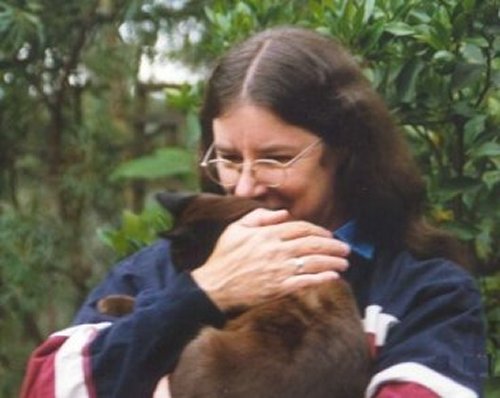
[Above] Photo of Sandy Jeffs by Robyn Adams, 1999.
Landscapes can encompass a vast array of offerings - the languid lie of the land, the ruggedness of the mountains, the desert's arid floor, indeed the whole enfolding capsule of the land we walk infuses in us a landscape we can never deny. It is always upon us. Just as the external landscape embraces us in an ineffable majesty, so too does another landscape embrace me: the landscape of lunacy, a deep dwelling mindscape we all fear. This landscape enmeshes us in a tangential nexus that defies rationality and sense. Just like the stellar orb of the night to which we have assigned a landscape of ten Principle Maria, so too does the lunatic have within them an array of mindscapes that come in all the various permutations madness creates. Living in a mind shadowed by spooks and phantoms, the Sea of Serenity often gives way to the Sea of Conflicts, and the earthly world's imperatives become the place where the lunatic, like the village idiot, is firmly located in the stocks of reason.
Into this landscape comes the poet, throwing off the shackles, unlocking the stocks, unleashing a language fructified by the Sea of Fertility, and lunacy and poetry coalesce in a marriage of extremes. Into this I come, sometimes mad, sometimes sane, acutely aware of a mindscape that seeks itself; wondering about the terrain within and without my mind, always longing to discover the landscape with poetry. I seek to understand lunacy, its complex mindscape and all its intensity, by searching for its defining moments in a language that tells us who we are. Thus madness has given substance to much of my writing, because for me my madness has been, and is, the biggest obstacle to leading a worthwhile life. Poetry has been a revelation in transcending these obstacles. To understand my flighty mind and somehow connect it to the world at large is to claim the landscape. To see the world through a poet's eyes and discover my place in its often baffling and angst-ridden localities; to be able to proclaim, without egotism or arrogance, but with a sense of myself, I am, is to fulfill the search for identity. The search for identity is poetry. Poetry is the search for identity.
I have spent twenty-two years scrambling on the schizophrenia rat-wheel, lurching from episode to episode, falling from sanity's realm into the miasmic chaos of madness, floundering in its all-consuming fires where its tendril flames sear my soul and render me helpless.
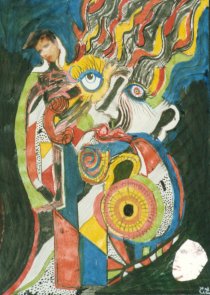
|
When the voices and delusions come, I enter a realm of reclusive imagination and invulnerable privacy. There is nothing more harrowing than this wilderness of insanity.
There is nothing more devastating than the depressions that throw one into the chasms of the mind's dark recesses where the dark door beckons.
Upon her face
the rancid breath of darkness'
intimations of love blew.
Upon her ears
fell the lusting whispers
of the demon of the depths.
And she, in lonely silence,
succumbed to the unbeckoned
giver of poisonous potions
and the turbid black bile
of black melancholy.' |
[Above] Betrayal of Trust by Coral Hull. (mixed media on paper, 1990, size unknown)
Theodore Adorno, in response to the Holocaust, said: 'A beautiful thought in a time of pain, is a lie' and 'To write poetry after Auschwitz, is barbaric'. It is my contention that in times of distress and pain, whether personal or cultural, we more than ever need the healing powers of poetry. But one must ask: Why poetry? What mindscape produces poetry and what landscape does it reveal?
Poetry seeks to peel the layers from life's distortions and travails, to give meaning where meaning cannot be found. In the imaginative process of creating poetry, the flow of words is not unlike lines of words fingering out their existence in the outer world to find a life of their own, revealing undercurrents and forces that cannot easily be given to words. The mind's eye is always challenged; it is always on the look out for narratives that inform the heart and mind, that want to be expressed in ways that bare the bones of the heart. Words enter the soul and exit as creations after a prolonged (or sometimes short) gestation period and often in a form, and with a meaning, that takes on dimensions that not even the Poet can control. There is exhilaration in this. Reason seems to be elevated to a new level that goes beyond reason's domain and poetry explores this unknown, some saying it enters a kind of madness. Some also say, poetry is the view from the sickroom of life. My poetry comes from a similar place; it comes from my mad mind's journey into its interior landscape, the inner reaches of the sickroom of the other side. This is a place we all fear, but I claim the territory for all who are silenced by its presence in their lives, bringing into full view the mad mindscape for all to see.
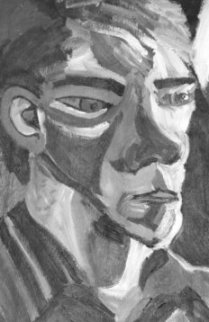
|
Robert Burton (1577-1640) in The Anatomy of Melancholy, claims: 'All poets are mad' invoking a nexus between madness and poets; as though a landscape of lunacy has an automatic relationship with poetry. This is not an isolated case. Wordsworth, lamenting the untimely death of the young poet Chatterton, tells us: 'We Poets in our youth begin in gladness/But thereof come in the end despondency and madness'. Shakespeare talks of 'The lunatic, the lover and the poet' all in the one breath. His landscape is an embellished understanding of forces one can only dream of when one has not made that journey to the other side. For some, madness is sought in an attempt to experience the thing that has fascinated us for all time, often seen as an exotic destination that will render insights and knowledge of the human condition. Like death, madness can only be imagined, laying open the way for false constructions, indeed madhouses become 'temples of consciousness' (Feder 1980 p286), rather than the corridors of troubled minds they really are. |
[Above] Untitled by Coral Hull. (acrylic on canvas, 1990, size unknown)
The landscape of lunacy hovers as a many-layered rendering of an image we can barely comprehend. I hasten to say, I do not believe for one moment that 'All poets are mad', nor do I wish to romanticise the 'mad' experience. There is nothing more terrifying or harrowing than the miasmic chaos of madness. Through poetry however, one does enter into a walk on the wild side, pushing the boundaries, entering territories many are too fearful to tread. The creative urge enters the body, the soul, the heart, the bones, indeed one's entire being. The Poet is, and must be, compelled by something unseen, but deeply felt. One cannot not do it. It must be done. Baudelaire saw the role of the Poet as being the one to bring 'golden verses out of stones' and 'flowers out of evil'. The Poet seeks to order an ever-increasingly disordered world, by becoming, as Wallace Stevens called it, a 'connoisseur of chaos' (Stevens in Pratt 1996 p5).
The Twentieth Century witnessed the most vile destructive forces at work and produced some of the most desolate poetry. The landscape was dark and murky and the poets were driven to write poetry that reflected the age. I seek to locate my own desolation and madness and render meaning from the meaninglessness of its discursive manoeuvres. Poetry very readily describes desolation and anguish and is capable of reflecting fragmentation in language that baffles, yet connects with inner threads. Poetry works as a secular religious experience, drawing the reader into contemplation of a subject with a use of language and a compacting of thought, almost like the exhortations and incantations of religious prayer. Yeats saw new possibilities for poets to 'overcome the slow dying of men's hearts', to 'lay their hands upon men's heartstrings again' (Yeats in Pratt 1996 p15). For T.S. Eliot, the role of the Poet is abundantly clear. With privileged knowledge and sensitivity, the poet must create and maintain the culture through poetic language, for it is the poet who will 'purify the dialect of the tribe'. (Eliot 1963 p218).
Wordsworth, in his Preface to the Lyrical Ballads, tells us that poetry is the 'spontaneous overflow of powerful feelings: it takes its origin from emotion recollected in tranquillity' and a poet must have 'thought long and deeply' because the 'poet thinks and feels in the spirit of human passions'. My poetry comes from long and deep thought, with one of its functions being not just to 'purify' a culture, but to purge my soul of its madness and rescue it from my self-destructive urges. Perhaps I would rather say my poetry comes, not from 'emotion recollected in tranquillity', but from the terrors of the contemplation of my seething desperation. My poetry is emotion recollected in melancholy. In my mindscape of madness, my poetry is elegaic; it is about songs of lamentation. The lamenting of things lost; lamenting the excruciating experiences that have transformed me forever. It is the search for the missing link between heart and mind, reason and emotion, the sacred and the profane, the personal and the public, the moral and the immoral, sorrow and joy, the spiritual and the temporal, love and hate, life and death, good and evil, self and the universe, self and others, self and self, madness and sanity, and to unlock all those mysteries and create order, but I shall never be the same because of my vista of madness.
I shall never be the same
after being on the
far side of madness
touched by its fire…
Ignorance talks of the
comfort of madness.
I talk of the far side of madness
and the flames of Hell.
No, I shall never be the same.
My meetings with all the precarious moods of my schizophrenia have thrown me into unimaginable turmoil, often leaving me unreachable and unreaching. Through this chaos my creative urge has been a lifeline that has sustained and enriched my life. Like Keats, poetry for me is an exploration of 'beauty' and 'truth'. The pursuit of beauty is an enduring quest, and to create something beautiful out of the pain and anguish of madness is healing and essential, because 'beauty is truth'. Not that I can achieve such a lofty aim. I have no illusions or delusions about my abilities. I am no Keats. I am no Plath or Dickinson. However, my aim is to move angels to tears. Poetry is a way of reconceptualising and restructuring my world. Poetry is my interface with society; the way in which I connect to the world. In a profound way it creates order from the tumultuous disorder that often renders me helpless. In poetry I attempt to grasp reality and create reality.
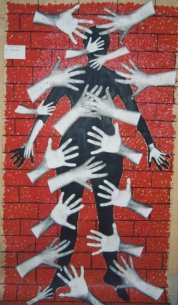
|
I am not afraid to claim my madness
but would not wish it upon anyone else…
Who wants to know that I wrestle
every day with veiled, turbid forces…
Who wants to know that I am not the
only one to lose the interlacing of being-
many, many souls suffer more than I.
Still, I claim my madness and speak out
to the world at large about my world within,
and ask for compassion for our battered psyches.
In looking into myself I have always had an overwhelming sense of evil and this is even more pronounced when I am mad. All my writing life I have felt myself to be driven from within, capable of terrible deeds, thus, in my poetry, I have had the compulsion to express both the horror and the disquiet struggling within my psyche. Over the centuries, poets have 'discovered that beauty could be made from ugliness, sublimity from sordidness' (Pratt 1996 p2). |
[Above] Body Search by Coral Hull. (acrylic on brown cardboard, 1990, 6' x 4')
I have discovered that writing about my madness has enabled me to delve the depths and turn disaster into celebration, to lay claim to an experience outside the norm and explore its meanings. My writing goes in part the way towards what Wyndham Lewis exhorted Ezra Pound to do after he had been incarcerated in a madhouse, which was to 'Sing the Chaos' (Lewis in Pratt 1996 p1).
Madness is elusive to the person who hasn't experienced it, and by writing about it I want to impart the agony and humour, the veiled spaces into which the mind disappears; to afford connections that 'induce in the reader's mind "the delicious joy of believing that they are creating" and so make the reader ... participate in the process by which the poem expresses meaning' (Pratt 1996 p15). In one sense, Wallace Stevens is right when he says, 'the poet is the priest [or priestess] of the invisible' (Stevens in Pratt 1996 p184). And what is more invisible than the inner world of madness? I write about the invisible mind, the mad mind, the 'reasoned unruliness of the senses' (Stevens in Pratt 1996 p184). Paradoxically, while I reveal the world of madness, I also reveal reality. Thus, while I slump into madness, I become aware of individual human pain and tragedy, I become aware of my own pain, yet I believe these can be resolved in works of the imagination. I make poetry out of the misery of existence, using whatever language I can to transcend the barriers my madness builds around me. The troubled mindscape becomes a palette with the textures and colours, the raw materials that inform the creations bursting forth from the senses, enabling me to document the ravages of madness on those it touches.
I have seen the best minds destroyed by madness…
I have seen these broken people,
with shattered personalities,
trying to piece together
the fragments of their lives
that will never be whole or united again.
I have seen their desperate struggles
for survival against a foe
that knows no boundaries and has no compassion.
I have seen myself.
Madness has plunged me into such depths it literally takes away one's breath. Virginia Woolf described her madness as 'her brains exploding like fireworks', yet 'In the ashes were her core ideas' (Bellamy quoting Woolf in Bell and Klein 1996 p128). In the ashes of my madness I have retrieved some of the lost dreams and turned them into poems. Yet, while writing about madness on the one hand 'seems to leave me plunged deep in the richest strata of my mind' and most frightening,' on the otherhand 'I can write and write and write now: the happiest feeling in the world' (Woolf 1975 p69). My madness has been a creative force. My poetry is for me what Suzanne Bellamy's creativity is for her, 'the key ... to recreating the self. This may be my most precious tool'. ... (Bellamy in Bell and Klein 1996 p129).
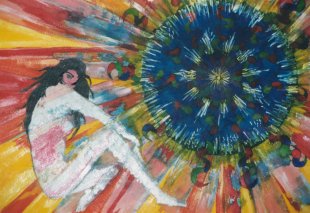 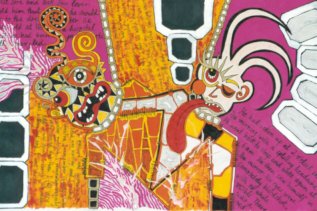
[Above Left] Blue Mandala by Coral Hull. (guache on paper 1990 size unknown) [Above Right] The Fight! by Coral Hull (mixed media on paper, 1990, size unknown)
Given the landscape of lunacy and all its peculiarities, I live in my mind often feeling locked in a casing lined with lead. I am fettered to a mindscape that is like living in a dream, or nightmare, which defies logic and shuns reality, leaving me an alien in my own culture. Like Virginia Woolf, my 'mind is full of monstrous, hybrid, unimaginable emotions and it is in this atmosphere of doubt and conflict' (Woolf in Bell and Klein 1996 p133) that I create. When the gaping distance of my mind is transformed by my imagination into a poem, it is cause for celebration. Virginia Woolf describes a similar process in her diary. She says, 'But how entirely I live in my imagination; how completely [ I ] depend upon spurts of thought, coming as I walk, as I sit; things churning up in my mind and so making a perpetual pageant, which is to be my happiness' (Woolf 1975 p67). If nothing else, madness gave me an unlimited array of material from which to create poems, because the experience of madness knows no boundaries, offering glimpses of the human condition that transcend definitions of the 'normal' experience. Nevertheless, I would not wish madness upon my worst enemy, for it is to journey into the depths of Hell and the searing fires that illuminate its landscape.
The fire consumes the energy
that once used to burn
with an industrious fury
when life was lived with
a ferocity that seized the day
and made each moment
sharper with a clarity of vision.
I shall never be the same.
When all is said and done there is no doubt writing gives me much joy. I love the process. Creating a poem from the depths of my imagination gives me a profound sense of elation and well being. To reflect and engage in the task of understanding my madness and the world in which I live, and then create from that experience, is to transcend the pain and reassert truth and beauty. Poetry is my identity, something I didn't have for many years. Poetry has given me a sense of myself as more than an undesirable label. Having said all this, how perniciously the spectre of madness lurks in every corner of every room, a reminder of its closeness. A landscape of lunacy lingers, revelling in its poetic utterances, imbued with its own meanings, but ultimately it is tamed by the thread of the Muse who claims me for herself. Indeed, to write poetry after madness is sanity.
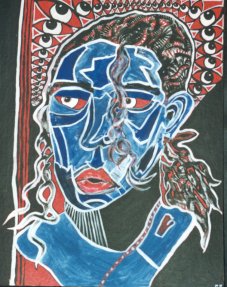
|
The Madwoman Speaks
You call me mad,
but I know all about that.
I celebrate each sane day
as a little triumph over
the constant haranguing of forces
wanting to destroy me.
You cannot rid me of my thoughts.
You cannot destroy strength.
You cannot destroy the will of
a woman who has
waded a corpse-infested Hell,
casting aside vermin,
breathing a furious fire
that ignites the passions.
Make no mistake,
a madwoman declares war! |
[Above] Angry Blue by Coral Hull. (acrylic on canvas, 1991, size unknown)
Poetry excerpts are taken from Poems From the Madhouse and Loose Kangaroos. Artwork by Coral Hull undertaken during her first year of a Bachelor of Conceptual Arts degree at the South Australian College of Advanced Education, and as part of art therapy classes at The Schizophrenia Fellowship of South Australia.
References
Bellamy, S., 'The Narrow Bridge of Art and Politics' in Bell, D. and Klein, R., Eds. 1996. Radically Speaking: Feminism Reclaimed (Spinifex Press, Melbourne).
Cohen, J. M. & M. J., 1974. The Penguin Dictionary of Quotations (Penguin Books).
Dugan, M., Ed.1998. Loose Kangaroos (Domain Press, Melbourne).
Eliot, T. S., 1963. Collected Poems 1909-1962 (Faber & Faber, London).
Feder, L., 1980. Madness in Literature (Princeton University Press Princeton, N.J.)
Jeffs, S./ Stains, D., 1993. Poems From the Madhouse/Now Millennium (Spinifex Press, Melbourne).
Pratt, W., 1996. Singing the Chaos: Madness and Wisdom in Modern Poetry (University of Missouri Press, Columbia).
Wordsworth, W., 1969. Poetical Works Ed. Thomas Hutchinson. (Oxford Uni Press, London).
Woolf, V., 1975. A Writer's Diary (The Hogarth Press, London).
About the Writer Sandy Jeffs
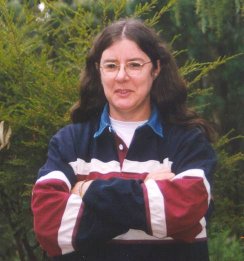
|
Sandy Jeffs grew up in Ballarat. She graduated from La Trobe University with an Arts Degree in 1975. When she was 23 she had her first psychotic episode and has since lived with schizophrenia. Her first book, Poems from the Madhouse, published by Spinifex Press in 1993, was awarded 2nd place in the 1993 FAW Anne Elder Poetry Award, as well as a Certificate of Commendation in the 1994 Human Rights Awards. Sandy is a co-author of Loose Kangaroos, Domain Press 1998, which also won a Certificate of Commendation in the 1998 Human Rights Awards. Loose Kangaroos is also the name of a group of sanity-challenged poets with whom she performs her poetry. Sandy is involved in the humorous documentation of the travails of ladies' midweek tennis, the subject of a forthcoming book called Confessions of a Midweek Lady. Spinifex Press are soon to publish a new book of poems Blood Relations. Sandy lives with her friends and animals on the outskirts of Melbourne. |
[Above] Photo of Sandy Jeffs by Robyn Adams, 1999.
I Next I
Back I
Exit I
Thylazine No.1 (March, 2000) |



